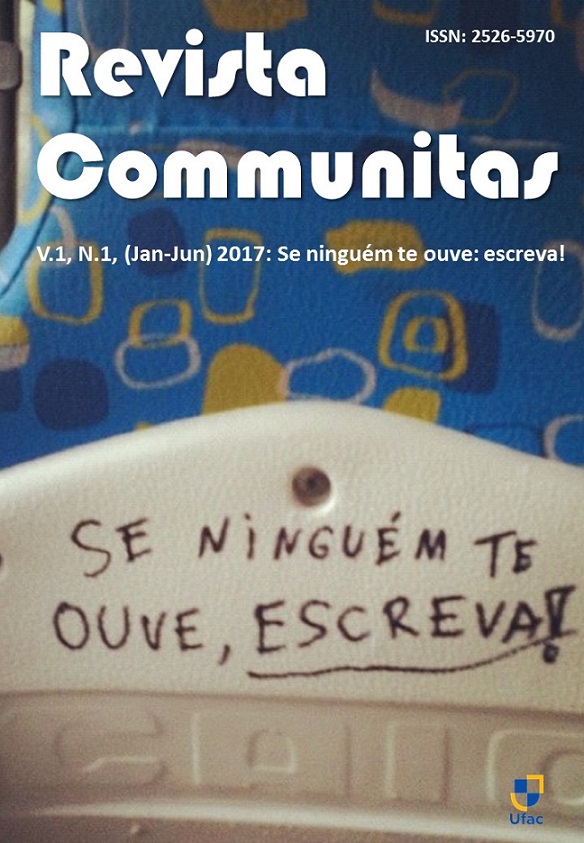<b>POSSÍVEIS RELAÇÕES ENTRE A ANTROPOLOGIA LÉVI-STRAUSSIANA E A LINGUÍSTICA ESTRUTURALISTA</b>
Keywords:
Claude Lévi-Strauss, Antropologia, Linguística estrutural, relações.Abstract
POSSÍVEIS RELAÇÕES ENTRE A ANTROPOLOGIA LÉVI-STRAUSSIANA E A LINGUÍSTICA ESTRUTURALISTA
Resumo: De maneira geral e simplista, é possível observar duas posturas nas ciências sociais, mais precisamente na Antropologia, no tocante à universalidade dos elementos culturais: de um lado, um grupo de estudiosos adeptos do particularismo/empirismo e, do outro lado, estudiosos que compreendem a cultura de acordo com a proposta universalista. Na tentativa de não incorrer em uma análise simplista da produção antropológica nos últimos anos, este trabalho objetivou refletir sobre a relação entre alguns estudos teóricos produzidos pelo antropólogo Claude Lévi-Strauss e a Linguística de base estruturalista para, fundamentalmente, observar como esta última influenciou a produção lévi-straussiana. Diferentemente dos autores particularistas/empiristas, Lévi-Strauss propõe analisar as relações sociais por meio de modelos formais que tivessem como objetivo compreender as regras estruturais subjacentes às relações sociais. Para tanto, o antropólogo, desenvolveu um arcabouço teórico-metodológico influenciado pela Linguística Estruturalista da Escola de Praga, sobretudo, pela fonologia desenvolvida pelo linguista Nikolai Troubetzkoy. Além desta inter-relação direta entre Antropologia e Linguística, Lévi-Strauss fez vários apontamentos importantes sobre as questões “em aberto” deixadas pelas duas áreas científicas.
Palavras-chave: Claude Lévi-Strauss, Antropologia, Linguística estrutural, relações.
POSSIBLE RELATIONS BETWEEN THE LÉVI-STRAUSS’ ANTHROPOLOGY AND THE STRUCTURALIST LINGUISTIC
Abstract: In a general and simple way it is possible to observe two postures in the social sciences, more precisely in Anthropology, in relation to the universality of the cultural elements: on one hand, a group of researches adept to particularism/empiricism; on the other hand, researchers understand culture according to a universalist proposal. In the attempt of not committing a simplistic analysis of the anthropological production in the last years, this paper aims at reflecting upon the relation between a few theoretical studies produced by the Anthropologist Claude Lévi-Strauss and the Structuralist linguistic, so that, fundamentally, to observe how the latter influenced Claude Lévi-Strauss’ production. Differently from particularism/empiricism, Lévi-Strauss proposes to analyze the social relations through formal models that would have as aim to understand the structural rules implied in the social relations. In order to do so, the anthropologist developed a theoretical and methodological framework influenced by Structuralist Linguistic of the Prague School, above all, by Phonology developed by the linguist Nikolai Troubetzkoy. Besides this straight inter-relation between Anthropology and Linguistic, Lévi-Strauss raised several important questions about unanswered issues left by the two scientific areas.
Key words: Claude Lévi-Strauss, Anthropology, Structural Linguist, relations.
POSIBLES RELACIONES ENTRE ANTROPOLOGÍA DE LÉVI-STRAUSS Y LA LINGÜÍSTICA ESTRUCTURALISTA
Resumen: De manera general y sencilla, es posible observarse dos situaciones en las ciencias sociales, más específicamente en la Antropología, con respecto a la universalidad de los aspectos culturales: de un lado, un grupo de estudiosos partidarios del particularismo/empirismo y, del otro, estudiosos que comprenden la cultura de acuerdo con la propuesta universalista. En el intento de no incurrir en un análisis sencillo de la producción antropológica en los últimos años, este trabajo tuvo como objeto reflejar respecto a la relación entre algunos estudios teóricos producidos por el antropólogo Claude Lévi-Strauss y la Lingüística basada en el estructuralismo para, fundamentalmente, percibir como esta última influjo la producción del dicho antropólogo. Diferentemente de los autores particularistas/empiristas, Lévi-Strauss propone analizar las relaciones sociales a través de los arquetipos formales que tuvieran como objeto comprender las reglas estructurales bajo las relaciones sociales. Para eso, el antropólogo, desarrolló un guión teórico-metodológico influido por la Lingüística Estructuralista de la Escuela de Praga, especialmente, por la fonología desarrollada por el lingüista Nikolai Troubetzkoy. Además de esta interrelación directa entre Antropología y Lingüística, Lévi-Strauss hizo varios apuntes importantes respecto a las cuestiones “abiertas” dejadas por las dos áreas científicas.
Palabras clave: Claude Lévi-Strauss, Antropología, Lingüística estructural, relaciones.
Downloads
References
BOAS, Franz. “As limitações do método comparativo da Antropologia”, Os métodos da Etnologia” e “Os objetivos da pesquisa antropológica”. In: Castro, C. (org.) Antropologia Cultural. RJ: Jorge Zahar, 2004: pp. 25-52;87-109.
KROEBER, Alfred & KLUCKHOHN, Clyde. “The Nature of Culture”. In: Culture. A critical review of concepts and definitions. Massachusetts: The Peabody Museum, 1952:pp. 83-94.
HYMES, Dell. “The use of Anthropology: critical, political, personal. In: Hymes, D. (Ed.). Reinventing anthropology. New York, Vintage Books, 1974:pp. 3-79.
LÉVI-STRAUSS, Claude. Antropologia Estrutural I. RJ: Tempo Brasileiro, 1970:85-100;313-360.
MALINOWSKI, Bronislaw. "Introdução", "III.Características essenciais do Kula", "XIX.O Kula interior" e "XXII.O significado do Kula". Em: Malinowski, B. Argonautas do Pacífico Ocidental. Um relato do empreendimento e da aventura dos nativos nos arquipélagos da Nova Guiné Melanésia. SP: Abril Cultural, 1984:17-34;71-86;335-344;365-372.
MORGAN, Lewis H. Systems of consanguinity and affinity of the human family. Oosterhout: Anthropological Publications, 1970 (Prefácio, parte I, Caps. 1 e 2): pp.V-IX; 3-15.
RADCLIFFE-BROWN, A. R. "Preface", "The Social Organization". Em: Radcliffe-Brown, A. R. The Andaman Islanders. The Free Press of Glencoe, 1964:1-87.
RIVERS. "O método genealógico na pesquisa antropológica". Em: Oliveira, R. C. (org.). A Antropologia de Rivers. Campinas: Unicamp, 1991:PP.155-178.
SAPIR, Edward. “Culture, Genuine and Spurious”. In: Mandelbaum, D. G. (Ed.). Selected Papers of Edward Sapir in Language, Culture and Personality. University of California Press, Berkeley, 1985:pp. 308-331. (Tradução em português)
TYLOR, Edward B. “A ciência da cultura”. Em: Castro, C. (org.) Evolucionismo Cultural. Textos deMorgan, Tylor e Frazer. RJ: Zahar Editor, 2005: pp. 67-100.
Downloads
Published
How to Cite
Issue
Section
License
The Copyright for articles published in this magazine belongs to the author, preserving the rights of first publication for the Communitas Magazine. Because they appear in this publicly accessible journal, the articles are free to use, with their own attributions, in educational and non-commercial applications.
























